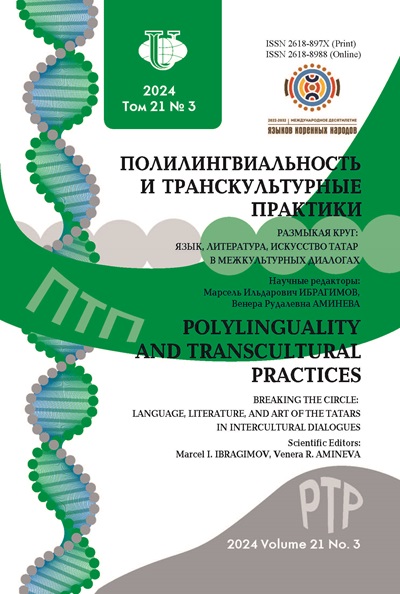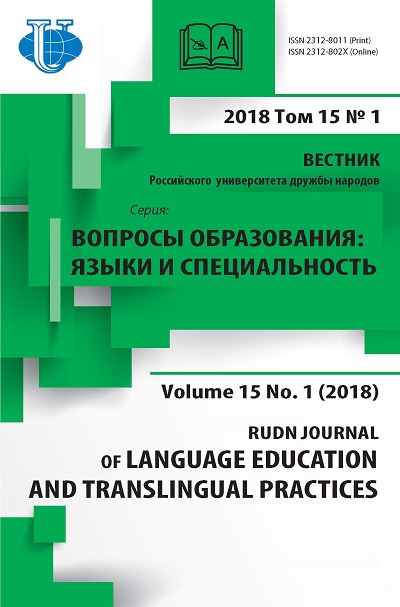Vitality of the Russian Language and Russian-Language Literature
- Authors: Todorova I.D.1
-
Affiliations:
- Peoples’ Friendship University of Russia
- Issue: Vol 15, No 1 (2018)
- Pages: 118-127
- Section: LITERARY SPACE
- URL: https://journals.rudn.ru/polylinguality/article/view/18111
- DOI: https://doi.org/10.22363/2312-8011-2018-15-1-118-127
Cite item
Full Text
Abstract
With this article we attempt to understand the vitality/viability of the Russian language through the prism of Russian-language (translational) literature, created by non-Russian origin authors. By vitality, we mean the language’s ability to survive, develop, maintain its systemic-typological properties. According to sociolinguists, the vitality of any language is measurable. There is a number of parameters: socio-political, socio-demographic, linguistic, socially-functional, national-cultural. The present work is focused on a special parameter for measuring the vitality of the Russian language - Russian-language literature. In our opinion, Russian-language literature (alternative definition - translational literature) is a complex interaction of two (or more) language systems, producing a semantically and structurally enriched literary field. The corpus of translational art texts is a database that accumulates and develops the potencies of the Russian language. Main methods: deductive and evaluation-descriptive.
About the authors
Ivelina Dimitrova Todorova
Peoples’ Friendship University of Russia
Author for correspondence.
Email: eve_li@mail.ru
Postgraduate Student at the Department of Russian Language and Intercultural Communication
6, Miklukho-Maklay str., Moscow, 117198, Russian FederationReferences
- Sulejmenova, Je.D., Shajmerdenova, N.Zh. et al. 2007. Slovar’ sociolingvisticheskih terminov [Dictionary of Sociolinguistics Terms]. Almaty: Қazaқ universitetі. Print. (in Russ.)
- Aujezov, M.M. 1997. Ippokrena. Hozhdenie k kolodcu vremen [The Path to the Well of Times]. Almaty: Zhibekzholy. Print. (in Russ.)
- Dzhusojty, N. 1957. O nacional’nom stile i nacional’nom jazyke [On National Style and National language]. Literaturnaja gazeta. Print. (in Russ.)
- Bahtikireeva, U.M. 2009. Tvorcheskaja bilingval’naja lichnost’ (osobennosti russkogo teksta avtora tjurkskogo proishozhdenija) [Creative Bilingual Personality]. Izd. 2-e dop. Astana: CBO i MI. Print. (in Russ.)
- Bakhtikireeva, U., and O. Valikova. 2017. Among the Wor(l)ds: Post-Soviet Translingual Literature // SGEM 2017 Conference Proceedings 4-th International Multidisciplinary Scientific Conference on Social Scitences and Arts. 24—30 August, Albena Co., Bulgaria Volume II. Pp. 391—398.
- Mazanaev, Sh. Mnogojazychie v mirovoj literature [Polylanguaging in a World Literature]. Literaturnyj Dagestan. Prilozhenie № 14. Access: 14.01.2003.
- Oskockij, V.D. 2001. Ot kakogo nasledstva my ne otkazyvaemsja (Zametki polemicheskie, nostal’gicheskie…). Voprosy literatury 6. URL: http://magazines.russ.ru/voplit/2001/6/oso-pr. html
- Lejderman, N.L. 2002. Spasat’ literaturu — spasat’sja literaturoj [To Save Society Saving Literature] (o statuse predmeta «Literatura» v rossijskoj shkole). Mir russkogo slova 3 (11): 58—66.
- Bahtikireeva, U.M., and O.A. Valikova. Istoki translingval’noj russkojazychnoj literatury [The Origins of Translingual Literature]. Social’nye i gumanitarnye nauki na Dal’nem Vostoke. 14 (1): 18—23.
- Bahtikireeva, U.M. 2015. Russkojazychie kak aktual’naja mezhdisciplinarnaja problema [RussianLanguaging as a Perspective Interdisciplinary Problem]. Social’nye i gumanitarnye nauki na Dal’nem Vostoke. 1 (45): 92—97.
- Valikova, O., and U. Bakhtikireeva. 2017. Literary Crossover: On the Problem of Literary Translingualism. Analele Universităţii din Craiova. Seria Ştiinţe Filologice. Lingvistică. No. 1-2: 218—230.















